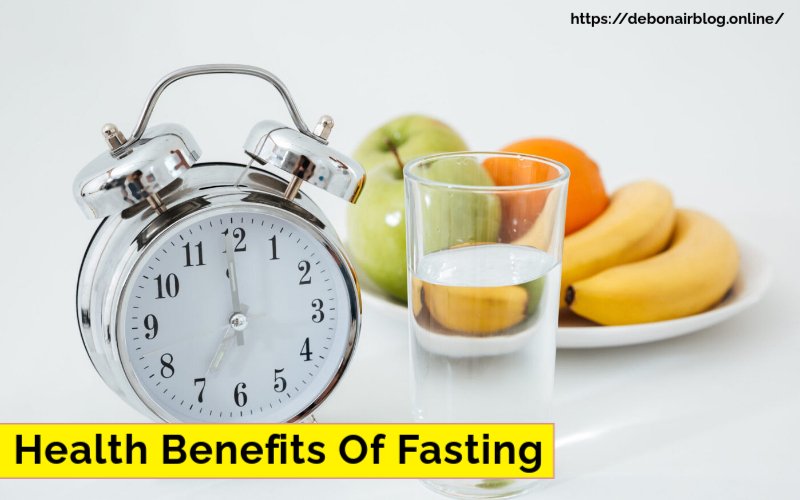
Fasting: Unlocking the Health Benefits for a Better You in 2024
Table of Contents
Traditionally, fasting was practiced not just for the sake of abstaining from food but also from spiritual and health perspectives. Today, as we look more and more into the practice of fasting as culture, we realize fasting can be an exceptional practice to enhance our health.
In addition to its wide weights, such as weight reduction and improved concentration of the mind, fasting can serve as an ideal way to adopt for people who are seeking a shift in their lifestyle. The types of fasting, the advantages of staying hungry and how one can make it a part of their busy schedule will be discussed in this article
What is Fasting?
It is self-regulated abstention from food, and sometimes also from drink, for a defined period. As scary as it sounds, several health advantages arise from fasting. This practice can be in the form of intermittent fasting for a few hours to someone starving for days.
One, irrespective of the kinds of it, has to keep the focus on the miracles of allowing the body to rest from active digestion—the process that is sought to be the prime motivating force for most life in the world.
The Biological Mechanism That Sustains Intermittent Fasting or Fasting
It is postulated that controls in the Islamic holy month of Ramadan, such as fasting, can bring about alterations in the body. One relying on a study by Mark Mattson of the National Institute of Aging argues that during fasting, cells trigger a series of adaptive responses, increasing their tolerance to stress and disease.
This switch over to fat metabolism is referred to as metabolic switching, which occurs after several hours of food deprivation and glucose usage.In addition to that, it has also been established that extended periods of fasting produce a coordinated set of responses in various organs.
A study by Queen Mary University of London showed that after three consecutive days of fasting, profound molecular changes happened in the body, creating evidence suggestive of recovery alongside weight loss after fasting.
Overall these results illustrate the need for clarifying how it operates with respect to our health at cellular level.
Types of Fasting
The fasting can be undertaken in a number of ways that are distinctively different in their application and benefits. Some of them are as follows:
Intermittent Fasting: In this form, cycles of eating and populating are alternated. Popular schedules include 16/8, where one fasts for 16 hours and eats during the 8 hour window, and the 5:2 diet, where a person eats normally for 5 days but is restricted to a low calorie diet for the other 2 days of the week.
Prolonged Fasting: Extending the time frame of fasting usually beyond 24 hours. Many people are advocates of this method, as they claim it produces striking and dramatic weight loss on fasting, but it is, nevertheless, a method that requires wisdom and supervision by a health care provider.
Alternate-Day Fasting: Here, a person is required to eat and fast on alternate days. On days of fasting, a person is only allowed to eat less than 500 calories.
Religious Fasting: A lot of religions allow fasting for spiritual purposes. For instance, Muslims fast during Ramadan months, while Christians usually fast during Lent.
It is essential to select the most appropriate type of fasting, as it comes with its own merits and demerits.
Health Benefits of Fasting
The health advantages of fasting have been proven and advanced in the medical field. Below are a few of its benefits: weight loss Fasting has weight reduction as one of its most common advantages. A lot of people can lose weight faster by simply cutting calories during fasting times.
Enhanced Metabolism: Fasting may increase the rate of fat oxidation and glucose uptake into cells, thereby increasing metabolic efficiency. As a result, the body becomes more effective in energy utilization.
Heart Health: A study shows that people who practice alternate-day fasting can reduce LDL cholesterol by 20 to 25 percent and triglycerides by 15 to 30 percent. These changes help in improving heart health.
Cognitive Enhancement: Effects on concentration and cognitive function during the fasting periods are more often reported. It has been established that working memory in animals and verbal memory in adults increase during intermittent fasting.
Anti-Aging: Other studies, however, propose that intermittent fasting slows down the aging process by decreasing inflammation and oxidative stress. Animal studies have consistently indicated that caloric restriction extends life expectancy.
These benefits explain the reason why most people are gravitating towards fasting with hopes of enhancing their general well-being. Concerning fitness, you must read Avocados: The Delicious Superfood You Need in Your Diet and The Health Benefits of Apples: Why You Should Make Them a Staple in 2024.
Intermittent Fasting for Beginners
New to fasting? Consider trying intermittent fasting for beginners to get into the practice. Here’s how you can begin:
Choose Your Method: Select a fasting schedule. It could be the 16/8 or any other schedule that fits your daily routine.
Stay Hydrated: You can consume other calorie-free drinks such as black tea or herbal tea during fasting times.
Focus on Nutrition: Limit your consumption to the calories that come from whole food. It could be fresh fruits, fresh vegetables, low-fat meat or chicken, seeds, whole wheat bread or similar food.
Listen to Your Body: If you are feeling too much hunger and if you are feeling tired during your fast, trying to remember the scope of the current schedule or seeking advice from a physician may be helpful.
If you do all of these things, there is no doubt that intermittent fasting can easily become second nature to you.
Customizing Your Intermittent Fasting Schedule
Your intermittent fasting schedule must be customized to suit specific requirements. They are:
Fasting Goals: Have a clear view of the purpose of fasting to either reduce weight, improve some health parameters, or sharpen the brain.
Find your best suitable Windows: Experiment with several eating windows, as people may have different preferences. For example, some do well with an 8-hour eating window, while some prefer 16 hours of fasting instead.
Meal Plans: Construct several balanced meal plans to ensure unhealthy foods are not taken during eating windows.
Maintain the Plan: Adapting to a new dietary schedule is challenging, particularly when there is no improvement within the first few weeks. Resist the temptation to prevent complaints.
By knowing your fasting schedule and practicing fasts properly, you are likely to have success with fasting.
Food Choices for Intermittent Fasting
Intermittent fasting windows are times to eat and fireplaces make proper nutrition choices. For this purpose, one should pay attention to:
Eating Whole Foods: First of all, it means those foods that are rich in nutrients—fruits, vegetables, whole grain products, low-fat meat, or fish.
Do Not Eat Processed Foods: These are usually nutrient-poor and high-calorie junk foods.
Be Practical: Make sure each meal incorporates carbohydrates, proteins, and fats to ensure that arms remain full for an extended period of time as well.
When you eat, be competent because the health benefits of this type of fasting are maximized when one observes the disgesting hours appropriately.
Fasting and Longevity
Those practicing fasting for a long period may easily associate this concept of longevity with the other dietary practices. It’s reported that caloric restriction extends lifespan across a number of species; however, this needs to be explicated further for the human race.
It does this, such as reduction of inflammation or improvement of repair processes within the cells. By taking away the constant need for digestion, it may facilitate autophagy, which can lead to better ageing results.
Although more studies aim at the usefulness of fasting practices in humans, more specifically in the area of longevity, early data is encouraging.
Mental Health Benefits
Interestingly, it doesn’t only Is not of mere physical health, logistic for Manit mental health as well. It is explored that brain shakra on pre-fasting days alters gastric cells in fasted days and hence, intermittent fasting will advance clinical outcomes .
During the hours in which the brain does not receive food, many people experience greater focus, pity because norepinephrine is increased.
Moreover, even some studies show that intermittent fasting may assist in reducing symptoms of anxiety and depression by stimulating the process called neurogenesis, which is the development of new neurons in the brain. Regular fasting could therefore benefit not only the body’s physical health but also the mental well-being of the person.
Timely Case Analysis
To further examine the case of intermittent fasting, let us consider the experience of Sarah:
Desperate diets have not resulted in much success for Sarah, who has been struggling with overweight problems for years. She decided to try the 16/8 intermittent fasting method after hearing about it on the internet—she would eat from noon to eight o’clock every day and would not eat anything outside those hours.
These days, at least, have been tough for Sarah due to hunger. However, after around two weeks, she started to get used to it. During the time that she could eat, she said she tried to eat as many whole foods as possible, a lot of vegetables and lean protein such as chicken breast or fish, a little bit of healthy fats like avocado, and avoided processed snacks completely.
By following this regimen for three months:
Sarah has lost 15 pounds.
For most of the days, she experienced greater energy levels.
Her blood sugar levels have improved a lot and have become stabilized.
Above all, she felt that her mind was the most clear and active that it has ever been.
Sarah’s case even shows how useful combining fasting—with its long periods without food—together with eating habits can be.
“It might be a fictional case study”
Fasting: Religious Views
However, fasting is not simply a recent dietary fad; it has significance in various religions all over the world.
For example, Muslims have Ramadan, which involves them fasting from dawn to dusk for the whole month for the purpose of faith and coming together with others.
“O you who have believed, decreed upon you is fasting as it was decreed upon those before you that you may become righteous” (Qur’an 2:183).
In Christianity, the lenten season does ask Christians for 40 days to fast from food or luxury items as a way to repent.
“but when you do fast, anoint your head, and wash your face.” — Matthew 6:17
Such religion encourages fasting not simply of the one spiritual aspect but also of the two social ones. This places fasting as more than a wholesome diet.
Fasting and its many aspects
If fat loss is the objective, what is intermittent fasting?
IM is an eating pattern where food has periods during which it intersperses with not eating at all.
Can I drink water during my fast?
Yes! It is permissible to drink water or other calorie-free drinks, as these make it easier to fast.
Is intermittent fasting permanent, or is it a method of losing weight only temporarily?
For most healthy individuals, intermittent fasting does not come with negative effects, but if one is doubtful, consultation with a healthcare provider is recommended.
What should I eat and drink during and after the fast?
Concentrate on lean proteins and vegetables instead of high-calorie junk food.
How do I know when it is time to break my fast?
16/8 or 5/2 are some of the common methods; adjust your time period according to what is most comfortable for you.
Will I feel hungry while fasting?
Some, yes, but most people adjust with time, and many don’t even feel hungry.
Can I combine intermittent fasting with exercise?
Yes! Most people who fast intermittently would continue to do their workout schedules.
What if I suffer from any disease to begin with?
Always seek permission from a physician if you are already suffering from a disease before initiating a new diet plan of any kind.
Will metabolism work if intermittent fasting is introduced?
Most definitely! It is effective at getting better metabolic function through fasting, which increases variances in oxidation of the fats.
How does this combination with coffee work when fasting?
Of course! Sugar-free herbal teas or black coffee would be fine for use.
What is the reasoning behind this? How does intermittent fasting help one with their oncentration?
People claim to feel more concentration while fasting because multiple shifts in hormones occur as one is fasting.
What are the main errors when commencing?
Absurd eating during eating hours or not drinking enough water can mess up results; better keep off! All in all, don’t overdrown with energy!
Conclusion
There are different ways of achieving fasting goals that suit different people’s habits, whether one is looking to lose weight or improve overall health! With adequate strategy of what ones’ best includes with regular practice over time, we tap into the great power we have within ourselves!

